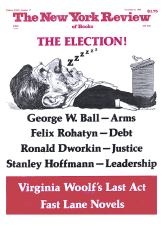In response to:
Breaking Up in Haifa from the June 14, 1984 issue
To the Editors:
Gabriele Annan has, of course, the right to her opinions about A.B. Yehoshua’s novel A Late Divorce and my translation of it [NYR, June 14], but I would like to make the following comments on her review:
1) Ms. Annan begins her review with the statement that “Ben-Gurion is supposed to have said that the day an Israeli cop arrested an Israeli crook Israel would have become a country like any other.” She is, I imagine, the only person to suppose that Ben-Gurion said anything of the sort. The remark in question, or rather, one similar to it, is commonly attributed to the poet Bialik—who, if he made it, did so in reference to Jewish settlement in Palestine long before the state of Israel or the word “Israeli” existed.
2) Ms. Annan writes that Yehuda Kaminka, the father in A Late Divorce, has left Israel and “emigrated to New England.” In fact, he has emigrated to Minneapolis, a detail that is mentioned several times in the novel, once in a page-long passage in which he points the city out to his wife on a map. We can all make an occasional slip, but this one would seem to indicate that Ms. Annan did not read the book she reviewed with excessive attention.
3) In criticizing my translation, Ms. Annan writes that “[the translator] uses antiquated slang like ‘with it’ and overdoes the vernacular (‘squelched by his father’ for ‘crushed by his father’) so that sometimes one seems to be in an Indian army mess,” and that the translation makes one feel that “one could be on the Lower East Side, with questions couched in the affirmative and expletive ‘alreadys’ dotted around like sesame seeds on a bagel.” I will not argue with Ms. Annan about “with it” lest I prove that I am not, nor can I claim to share her formidable knowledge of Indian army mess usage (although I might point out that in A Late Divorce it is the father who says that he feels “squelched” by his son, not vice versa, which says something both about my choice of the word and, once again, about how Ms. Annan reads a text); out of curiosity, however, I did take a good look at the novel’s sixth chapter, one of two in the book that is written entirely in dialogue—and there, in twenty-eight pages, I found three “alreadys,” none of them expletive, and, out of well over one hundred questions, eight couched in the affirmative. I should think that is within permissible limits.
4) Finally, a word regarding Ms. Annan’s closing remark that, “Besides, their [the characters in Yehoshua’s novel] language is Hebrew, the only one that cannot possibly sound Jewish.” It seems to me that this attempt at humor (or so I take it to be) is not only supercilious; it is also—especially coming from someone who obviously knows no Hebrew, a language with a three-thousand-year-old history of uninterrupted Jewish religious and literary creativity—in rather questionable taste. Or does Ms. Annan really think that the Lower East Side and bagels is all that Jewishness is about?
Hillel Halkin
Zichron Ya’akov
Israel
The Editors replies:
Concerning Mr. Halkin’s first point, Rabbi Arthur Hertzberg, the author of The Zionist Idea, has written as follows: “This remark has been variously attributed to Bialik, to David Frichman, and, as I told the editors, to David Ben-Gurion. Indeed, he said something similar to me when I visited him in 1949.”
This Issue
November 8, 1984



